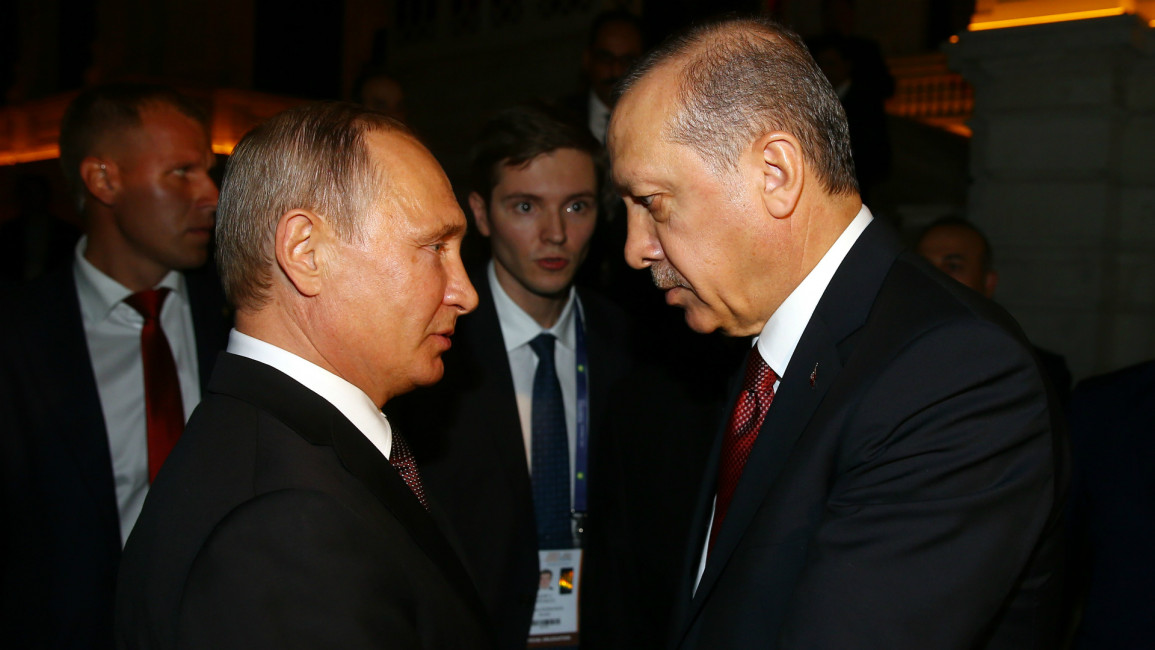Putin, Erdogan discuss Syria in phone call: Kremlin
Russia's President Vladimir Putin and Turkish President Tayyip Erdogan discussed the upcoming meeting of the Astana process on the Syrian conflict during a phone call on Saturday, the Kremlin said.
The two leaders spoke about joint efforts within the Astana process, including the creation of "de-escalation zones" in Syria, and further coordination towards resolving the Syria situation, the Kremlin said in a statement.
"Overall, the conversation was business-like and constructive, directed at strengthening bilateral cooperation and interaction on the regional agenda," the Kremlin said.
The two-day meeting, which will take place on October 30-31 in the Kazakh capital, will be the seventh round of negotiations this year that are co-sponsored by regime backers Russia and Iran and rebel supporter Turkey.
At the last set of talks in September, Russia, Turkey and Iran - which brokered the Astana talks - agreed to allocate forces to patrol the zone covering rebel-held Idlib province and neighbouring regions.
The de-escalation agreement excludes both the Islamic State group and Hayat Tahrir al-Sham, the alliance dominated by al-Qaeda's former Syrian affiliate.
Violence has drastically decreased in the zones since their establishment this year, but conflict is still raging elsewhere in Syria, including a US-led aerial and ground assault on jihadists groups in the country's northeast.
The diplomatic push brings together the Syrian government and representatives of the opposition, including some key armed groups who had previously steered clear of other negotiations.
Moscow has been spearheading the talks in a bid to pacify Syria after its game-changing intervention on the side of President Bashar al-Assad.
The latest developments come after the United Nations Syria envoy met with Russia's defence minister in Moscow last week, ahead of the talks.
Staffan de Mistura and Sergei Shoigu gathered to "discuss ways of moving from de-escalation zones towards a more stable political settlement in Syria," de Mistura was quoted as saying by a defence ministry statement.
The Syrian conflict began when the Baath regime, in power since 1963 and led by Assad, responded with military force to peaceful protests demanding democratic reforms during the Arab Spring wave of uprisings, triggering an armed rebellion fueled by mass defections from the Syrian army.
According to independent monitors, hundreds of thousands of civilians have been killed in the war, mostly by the regime and its powerful allies, and millions have been displaced both inside and outside of Syria.
The brutal tactics pursued mainly by the regime, which have included the use of chemical weapons, sieges, mass executions and torture against civilians have led to war crimes investigations.


![President Pezeshkian has denounced Israel's attacks on Lebanon [Getty]](/sites/default/files/styles/image_684x385/public/2173482924.jpeg?h=a5f2f23a&itok=q3evVtko)



 Follow the Middle East's top stories in English at The New Arab on Google News
Follow the Middle East's top stories in English at The New Arab on Google News


